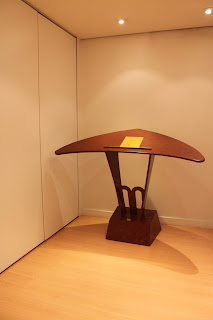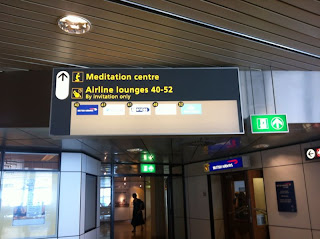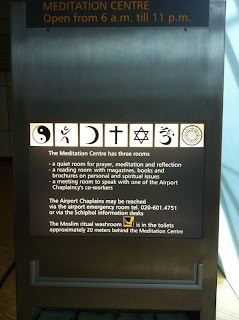This post was originally published in Aquila Style, 20 Jul 2013.
I realise that this is a privilege on my part, to be able to fly halfway across the world. I’m not doing it just for the shorter hours, though; I’m also looking forward to being with my family during what I consider to be the most special celebration of my entire year. I have explained it to fellow Dutch people that Ramadan and Eid ul-Fitr in combination is just like Christmas for them (perhaps a weak analogy seeing how Christmas and Easter celebrations have been secularised for most of the country, but it will have to do).
Today’s travel times are much shorter than what the 7th-century travellers mentioned in the Qur’an had to deal with. We can travel almost anywhere in the world in a matter of a few days. Some things, however, remain the same. Here are some things to consider if you are flying during Ramadan:
1. Fasting
Travellers are exempt from fasting during a journey (2:184-5), but some will want to anyway. Those whose work involves travel may decide to fast some days instead of missing out on the whole month.
For example, my friend works as an air stewardess and crosses time zones every three days. When Ramadan comes around, she eats a meal on board for sahur, and breaks her fast when the sun sets at the plane’s destination – wherever that might be, and however long her fast may be. At the end of the month, she tallies the total number of days and pays back a few days later in the year to make up 29 or 30 days.
2. Conserving energy
During Ramadan my energy levels are lower than usual, so I don’t want to deal with the extra hassle of luggage. I pack only the bare minimum and try to travel as light as possible. While I may have to carry on a heavy item like my laptop, I try to check in as much of my other belongings as possible.
As much as possible, I make use of online check-in (if available) so that I only have to drop off my luggage at the airport. This is often a separate and shorter line, or for some airlines a completely automatic process with the use of drop-off luggage machines. No more standing in long queues!
3. In-flight meals
As I booked my ticket for this upcoming journey, my husband realised that the flight was at 10pm – just after iftar time. I didn’t know if the airline would serve dinner so late at night, so I sent them a quick email. Happily, the airline responded that they would serve meals in time for iftar and sahur to any passenger that wanted it, throughout Ramadan.
If in doubt, ask in advance. Many airlines are happy to accommodate their passengers’ needs even though Ramadan may not be in their calendar. If there are no meals served, it is also possible to bring your own dates and meals onboard, and water is always available upon request.
4. Prayers
While this may not be a concern specific to Ramadan, it’s still helpful to know that many airports have a meditation or prayer room (specific or interfaith) in at least one of their terminals (even where you least expect it). While such rooms are expected and abundant in airports of Muslim-majority countries such as Qatar and the United Arab Emirates, I have been to prayer rooms in Charles de Gaulle airport in Paris, Suvarnabhumi airport in Bangkok, Madrid Barajas airport, Schiphol airport in Amsterdam and, of course, Changi airport in Singapore.
I was once in Paris’ main airport, where there were separate Christian, Jewish and Muslim prayer rooms. When I peeked into the Muslim room, it was full of men in congregational prayer. Intimidated, I tiptoed over to the empty Jewish room. I opened the door tentatively and ready to explain myself, but there was no one there. It was also spacious and clean and I could do my prayer in total silence. Thank Allah!As for praying on the plane, while I have seen some passengers pray in the aisles in their best approximation of the direction of Mecca, I usually pray unobtrusively in my seat. By checking the ‘live’ flight path on your inflight entertainment screen (if available) or visualising the airplane’s general flight path, it is also possible to approximate the direction to Mecca from your seat.
The Qur’an also gives travellers the option to shorten their prayers when in unusual circumstances (4:101-3). The Shafi’i school of thought elaborates on how to do this through the use of qasar (shortening) and jama’ (combining) prayers. The Qur’an also gives the option of doing tayammum (dry ablution) in special circumstances (5:6). If water is available, one may also do only the obligatory ablution (5:6) – washing hands, face, arms, hairline, and feet, only once – to save on time and public water resources. Make the most out of these exemptions.
5. Security checks
I’ve been asked to remove my headscarf and cardigans at security checks. I’ve also had friends recount to me their unpleasant experiences being asked to remove their hijab or their dupatta. I have also been detained, without any explanation, in a room at Houston Airport, while my name (well, more probably my father’s name which contains ‘Muhammad’) was run through a database. I have also had immigration officers ask me unnecessary questions because of my name.
These experiences are indeed extremely unpleasant and I wish no one had to go through them. However, I try my best to get around the situation with excuses such as ‘I am bald and would rather not remove it’, ‘I’m not wearing anything else underneath’, or simply say ‘I cannot remove this’. Depending on the country I fly from, I have varying degrees of success when doing this!
I also try to get past security checks and get to the boarding area as soon as I can. This gives me some quiet moments to myself and also reassures me that if I ever fall asleep, someone will wake me up to make sure I board the plane!
Whether one travels for work or pleasure during Ramadan, I hope that it can be a pleasant experience for everyone. I believe that the reason God gives us exemptions while travelling is because it can indeed be difficult and God understands us best.
--
Having to fast in the summer months for the second year in a row, I’m escaping to the tropics towards the end of this Ramadan. After about 20 days fasting for 19 hours each day in the Netherlands, I’ll be over the moon thinking about fast for a duration that I am most used to: 13 hours in Singapore.I realise that this is a privilege on my part, to be able to fly halfway across the world. I’m not doing it just for the shorter hours, though; I’m also looking forward to being with my family during what I consider to be the most special celebration of my entire year. I have explained it to fellow Dutch people that Ramadan and Eid ul-Fitr in combination is just like Christmas for them (perhaps a weak analogy seeing how Christmas and Easter celebrations have been secularised for most of the country, but it will have to do).
Today’s travel times are much shorter than what the 7th-century travellers mentioned in the Qur’an had to deal with. We can travel almost anywhere in the world in a matter of a few days. Some things, however, remain the same. Here are some things to consider if you are flying during Ramadan:
1. Fasting
Travellers are exempt from fasting during a journey (2:184-5), but some will want to anyway. Those whose work involves travel may decide to fast some days instead of missing out on the whole month.
For example, my friend works as an air stewardess and crosses time zones every three days. When Ramadan comes around, she eats a meal on board for sahur, and breaks her fast when the sun sets at the plane’s destination – wherever that might be, and however long her fast may be. At the end of the month, she tallies the total number of days and pays back a few days later in the year to make up 29 or 30 days.
2. Conserving energy
During Ramadan my energy levels are lower than usual, so I don’t want to deal with the extra hassle of luggage. I pack only the bare minimum and try to travel as light as possible. While I may have to carry on a heavy item like my laptop, I try to check in as much of my other belongings as possible.
As much as possible, I make use of online check-in (if available) so that I only have to drop off my luggage at the airport. This is often a separate and shorter line, or for some airlines a completely automatic process with the use of drop-off luggage machines. No more standing in long queues!
3. In-flight meals
As I booked my ticket for this upcoming journey, my husband realised that the flight was at 10pm – just after iftar time. I didn’t know if the airline would serve dinner so late at night, so I sent them a quick email. Happily, the airline responded that they would serve meals in time for iftar and sahur to any passenger that wanted it, throughout Ramadan.
If in doubt, ask in advance. Many airlines are happy to accommodate their passengers’ needs even though Ramadan may not be in their calendar. If there are no meals served, it is also possible to bring your own dates and meals onboard, and water is always available upon request.
4. Prayers
While this may not be a concern specific to Ramadan, it’s still helpful to know that many airports have a meditation or prayer room (specific or interfaith) in at least one of their terminals (even where you least expect it). While such rooms are expected and abundant in airports of Muslim-majority countries such as Qatar and the United Arab Emirates, I have been to prayer rooms in Charles de Gaulle airport in Paris, Suvarnabhumi airport in Bangkok, Madrid Barajas airport, Schiphol airport in Amsterdam and, of course, Changi airport in Singapore.
I was once in Paris’ main airport, where there were separate Christian, Jewish and Muslim prayer rooms. When I peeked into the Muslim room, it was full of men in congregational prayer. Intimidated, I tiptoed over to the empty Jewish room. I opened the door tentatively and ready to explain myself, but there was no one there. It was also spacious and clean and I could do my prayer in total silence. Thank Allah!As for praying on the plane, while I have seen some passengers pray in the aisles in their best approximation of the direction of Mecca, I usually pray unobtrusively in my seat. By checking the ‘live’ flight path on your inflight entertainment screen (if available) or visualising the airplane’s general flight path, it is also possible to approximate the direction to Mecca from your seat.
The Qur’an also gives travellers the option to shorten their prayers when in unusual circumstances (4:101-3). The Shafi’i school of thought elaborates on how to do this through the use of qasar (shortening) and jama’ (combining) prayers. The Qur’an also gives the option of doing tayammum (dry ablution) in special circumstances (5:6). If water is available, one may also do only the obligatory ablution (5:6) – washing hands, face, arms, hairline, and feet, only once – to save on time and public water resources. Make the most out of these exemptions.
5. Security checks
I’ve been asked to remove my headscarf and cardigans at security checks. I’ve also had friends recount to me their unpleasant experiences being asked to remove their hijab or their dupatta. I have also been detained, without any explanation, in a room at Houston Airport, while my name (well, more probably my father’s name which contains ‘Muhammad’) was run through a database. I have also had immigration officers ask me unnecessary questions because of my name.
These experiences are indeed extremely unpleasant and I wish no one had to go through them. However, I try my best to get around the situation with excuses such as ‘I am bald and would rather not remove it’, ‘I’m not wearing anything else underneath’, or simply say ‘I cannot remove this’. Depending on the country I fly from, I have varying degrees of success when doing this!
I also try to get past security checks and get to the boarding area as soon as I can. This gives me some quiet moments to myself and also reassures me that if I ever fall asleep, someone will wake me up to make sure I board the plane!
Whether one travels for work or pleasure during Ramadan, I hope that it can be a pleasant experience for everyone. I believe that the reason God gives us exemptions while travelling is because it can indeed be difficult and God understands us best.









No comments:
Post a Comment